Community Education
Peninsula elementary students take their learning outdoors
A gaggle of 4- and 5-year-old students at Evergreen Elementary stood in line, squirming with excitement Tuesday at the gated entrance to a wide-open field graced only by a circle of tall fir trees.
Education Sponsor
Education stories are made possible in part by Tacoma Community College, a proud sponsor of Gig Harbor Now.
School staff are developing plans for an outdoor learning space here. For starters, plans call for rocks and logs to climb on, dirt and sand to dig in, native plants, raised garden beds and a weather station. The vision is coming together slowly, said Principal Hugh Maxwell.
On a signal from teacher Amanda Kennard, the youngsters spilled over the hill and out onto the field. They swarmed over rocks and around the trees. Maxwell had hidden a gingerbread man, quickly found by student Eden Henderson.
Within minutes, the kids had made a pile of fir cones. They balanced on the rocks and raced across the field in a V-formation, like geese flying.
Some students found downed branches and waved them through the air. Maxwell showed them bits of lichen that had fallen from the trees. Student Atticus Golding goofed around with a lichen beard.
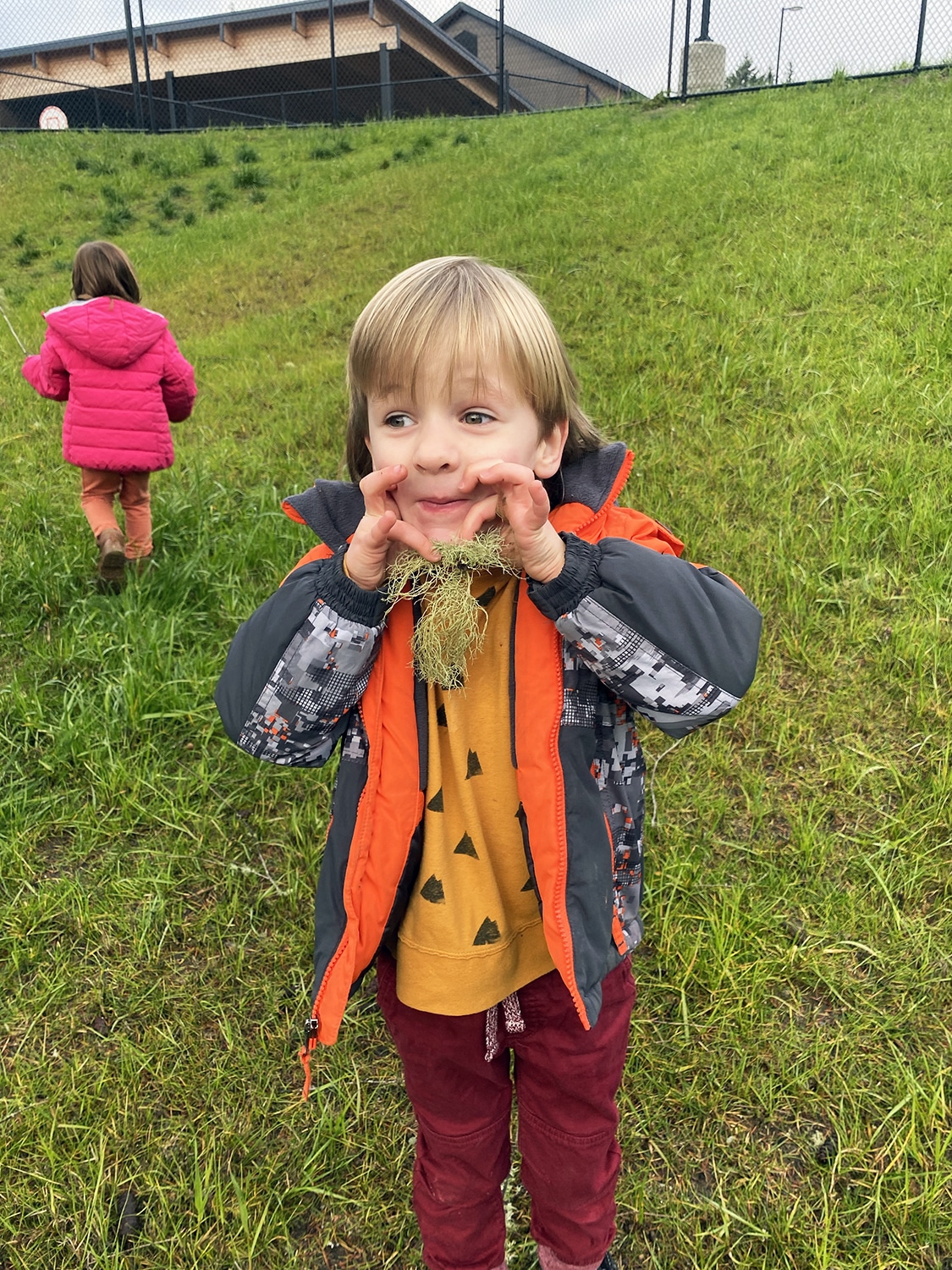
Atticus Golding has a lichen beard in the outdoor education area of Evergreen Elementary School on Dec. 13, 2022. Christina T Henry
Advantages of outdoor education
The outdoor learning space at Evergreen is part of a new initiative within Peninsula School District to get students out and learning by interacting with nature.
“One of the things we know about outdoor learning opportunities for young children particularly is that they have more opportunities; they learn how to take risks, they become problem solvers,” said Lisa Reaugh, executive director of student services.
Voyager Elementary also has an outdoor learning space. Outdoor learning is woven into the curriculum for the youngest students there, who also regularly access nearby Kopachuck State Park.
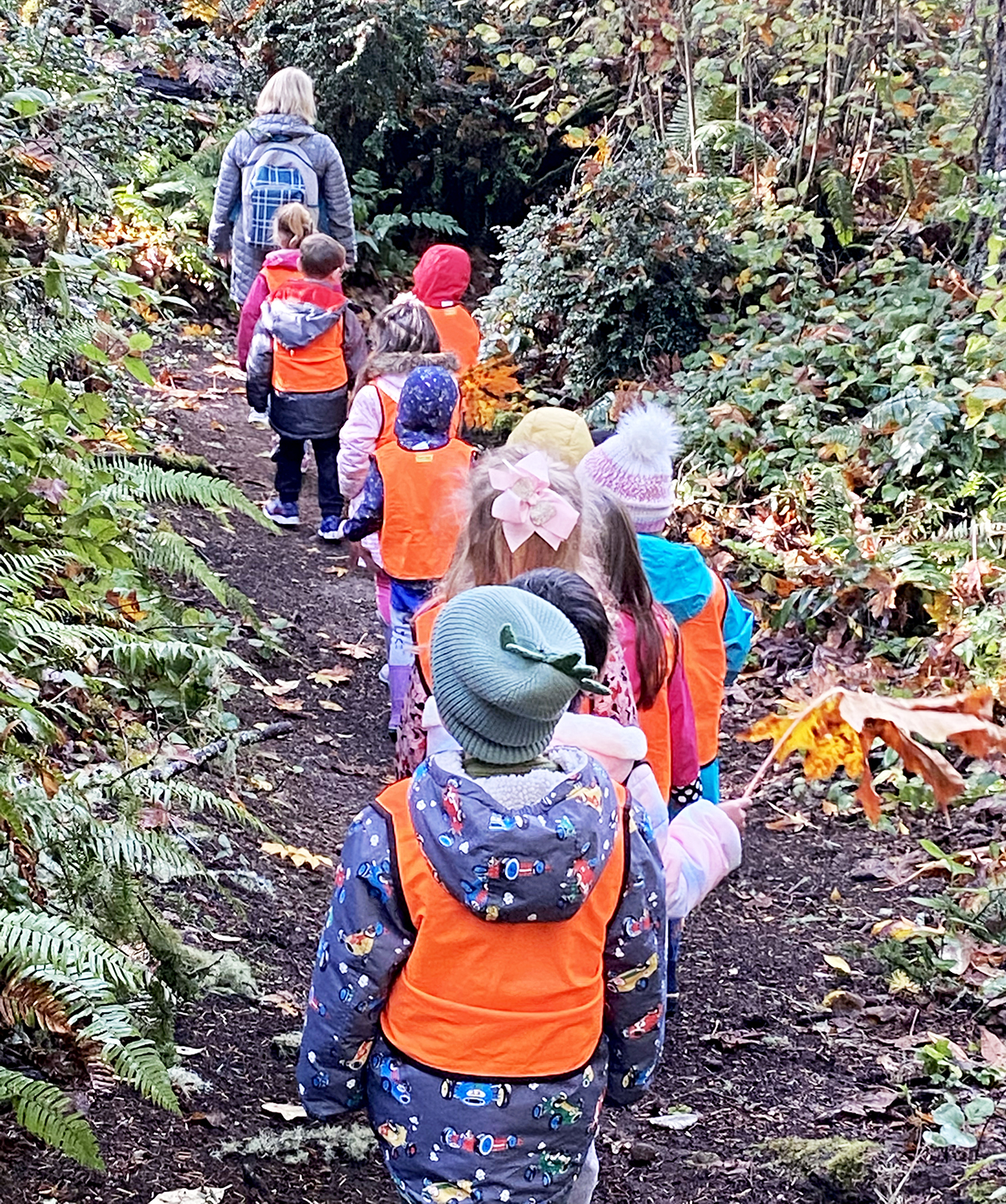
Students in Voyager Elementary School’s Transitional Kindergarten Program hike in Kopachuck State Park as part of their outdoor learning curriculum. Melissa Northstrom, Peninsula School District
According to Reaugh, there’s been a strong push toward outdoor education at the state level. Kids learn by direct experience in outdoor settings in ways they don’t learn in classrooms.
Peninsula Superintendent Krestin Bahr and school board President Natalie Wimberley earlier this year took part in a conference in Norway where they connected with educators in Gig Harbor’s sister city, Bodø.
Outdoor learning is a well-established trend there. Bahr and Wimberley returned from the conference championing outdoor ed.
Finding STEM in the outdoors
Outdoor education dovetails with the burgeoning field of science, technology, engineering and math, where career opportunities abound, said Amy Barber, Evergreen’s STEM integration specialist.
Not all kids have equal access to those outdoor experiences. That makes the new initiative especially important at Evergreen, the district’s only “high poverty” elementary school, based on state standards.
Finally, there’s the “social-emotional” benefit of outdoor learning.
“There’s a lot of research to show just getting kids outdoors really helps their mental health,” Maxwell said.
Voyager’s outdoor space
Voyager Elementary also has an outdoor learning space. Although it’s quite a bit smaller than Evergreen’s — more like a play yard — it has a host of features designed to draw young students into outdoor play.
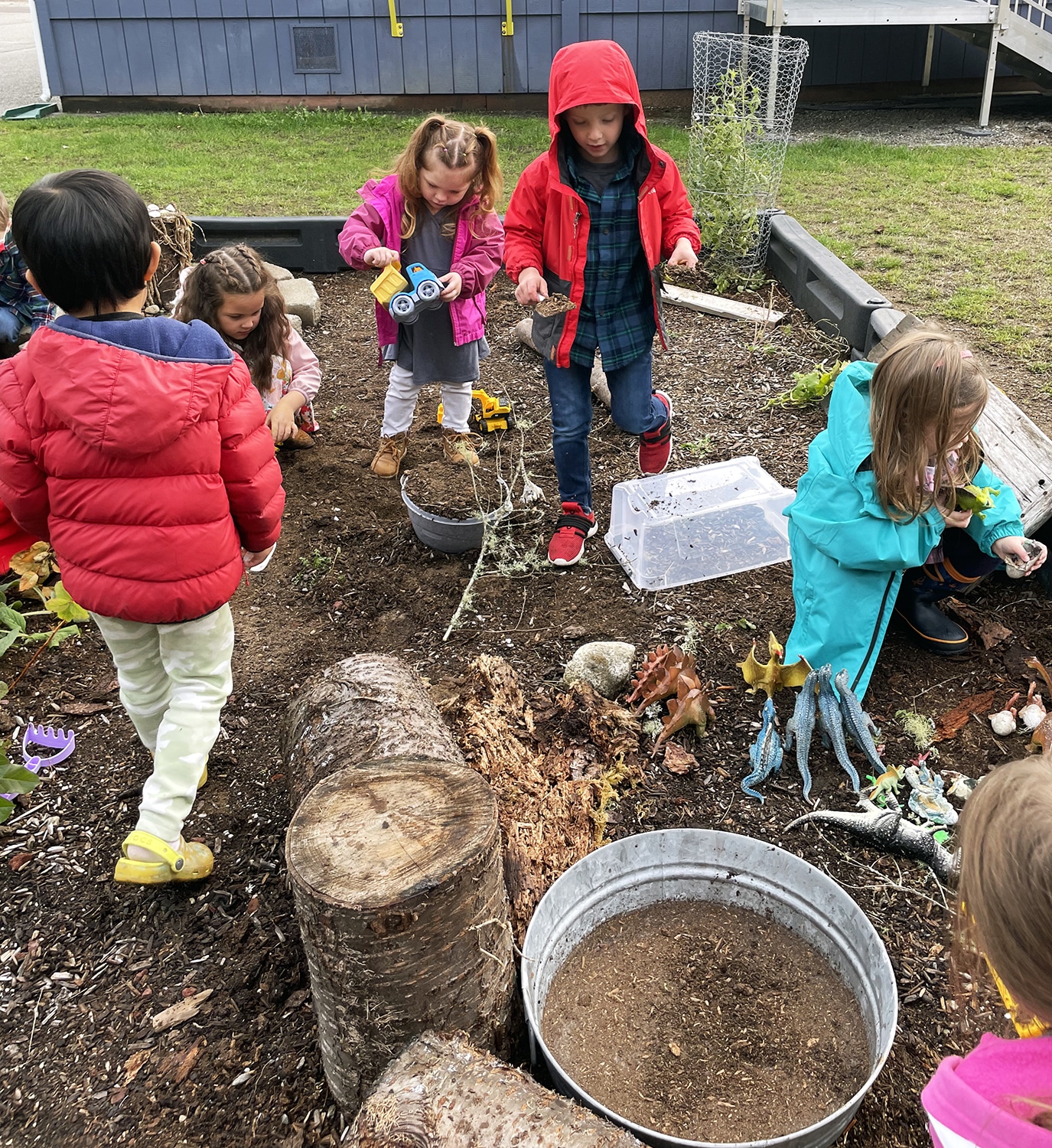
Students in Voyager Elementary School’s Transitional Kindergarten Program play in the school’s outdoor education space. Melissa Northstrom, Peninsula School District
There’s a “fairy garden,” a mud kitchen, a stump walkway, planter boxes and plenty of dirt. All materials — such as mulch, bark and sand — were donated by families or found in nature by Melissa Northstrom, transitional kindergarten teacher who oversees outdoor education at Voyager.
Here, outdoor education focuses on the school’s youngest students. Transitional kindergarten is for children who weren’t quite old enough for kindergarten this year and who have missed out on other preschool opportunities.
The purpose is to introduce these students to school routines and accelerate learning before they enter kindergarten.
The TK connection
Peninsula School District launched the Transitional Kindergarten program in January 2021. According to Reaugh, the goal is to reach students whose families make too much to qualify for state-funded preschool but who, for whatever reason, may not have had access to high-quality preschool.
The state funds transitional kindergarten, which resembles regular kindergarten. It’s full-day and has a similar curriculum. Placement, however, is not guaranteed. Peninsula’s transitional kindergarten program has a wait list.
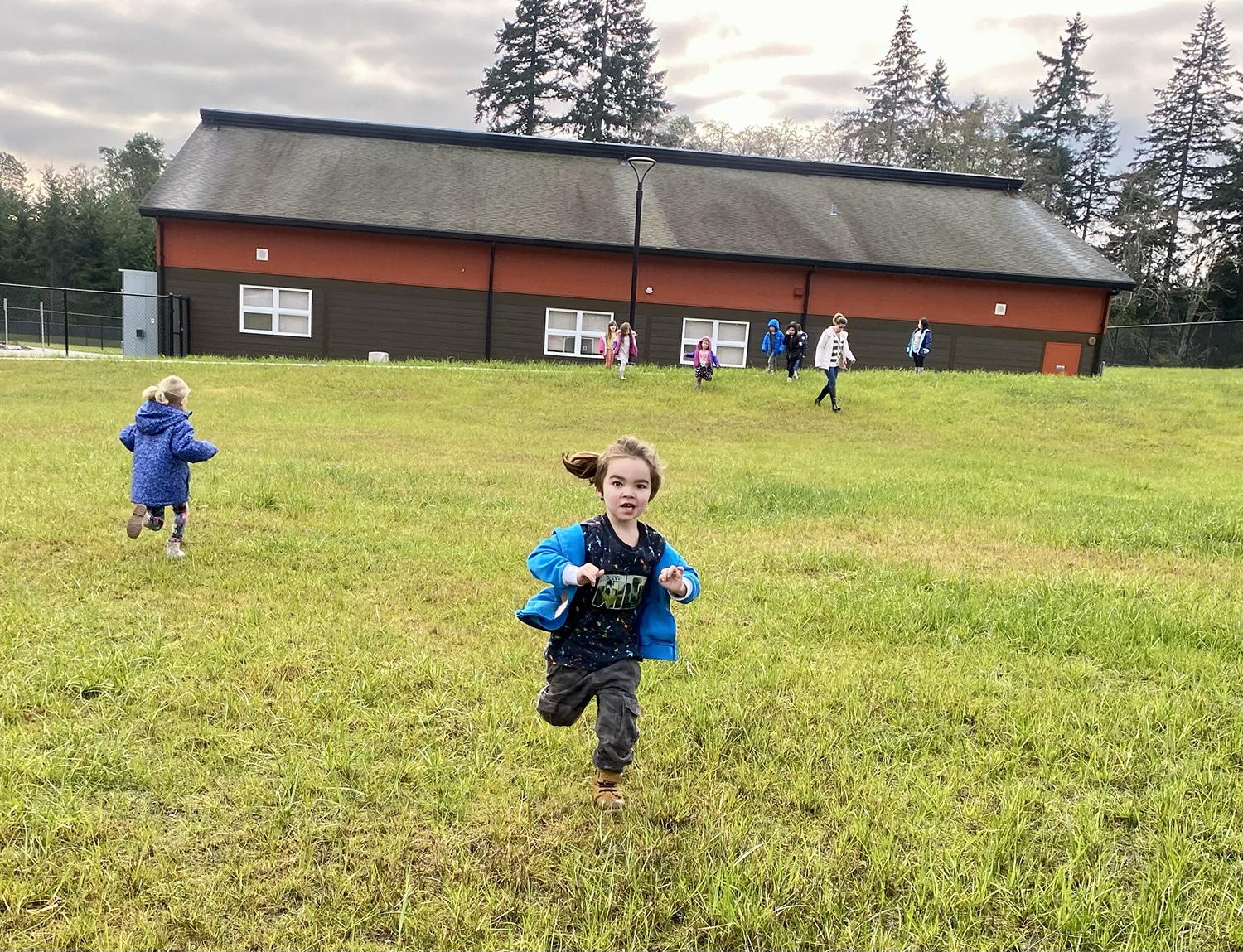
A student runs in the outdoor education area of Evergreen Elementary School on Dec. 13, 2022. Christina T Henry
Transitional Kindergarten classes began in November this year with one class each at five Peninsula elementary schools: Discovery, Evergreen, Harbor Heights, Minter Creek and Voyager.
Among those schools, only Evergreen and Voyager offer an outdoor-based curriculum.
“We try to get outside at least an hour a day to explore and play,” Northstrom said. “As the year goes on, I hope to extend our time outside longer and longer. Sometimes we hike over to Kopachuck State Park and explore the trails. Other times we stay and play in our own outdoor garden.”
The garden is new and, as with Evergreen’s outdoor space, it’s evolving.
“My goal was to create an outdoor space that the students can be kids in,” Northstrom said. “They can dig, explore, play in the sand, make mud soup, and use their imaginations to create fairy gardens, dinosaur land, and so much more. It is so fun to see my TK students discover, play, explore, learn and connect each day out in nature.”
Wildwoods 2.0
The outdoor learning space at Evergreen is a reboot of an earlier outdoor space on school property called Wildwoods.
The former 2.5-acre undeveloped site on Evergreen’s property was unique among Peninsula schools. Evergreen staff with community volunteers cleared the land of invasive plants and created a network of paths. Teachers used it for outdoor learning, and students enjoyed it as a quiet place to relax and reflect.
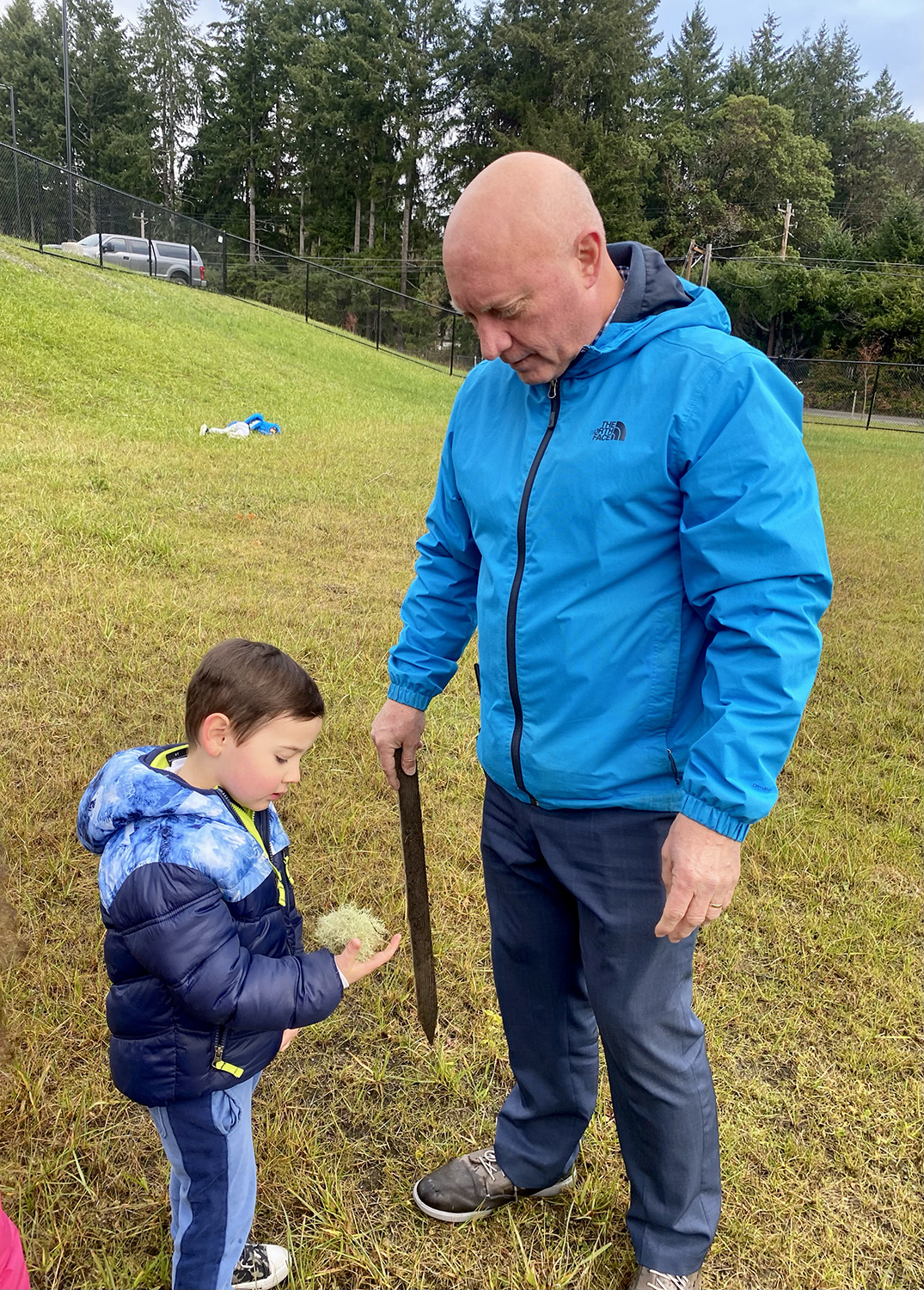
Evergreen Elementary Principal Hugh Maxwell shows Connor Kovalick a piece of lichen in the outdoor education area of Evergreen Elementary School on Dec. 13, 2022. Christina T Henry
When the district acquired additional property that allowed for construction of the new Evergreen Elementary with money from a 2019 bond, the Wildwoods site became the new parking lot. “It was heard to give it up,” Maxwell said.
But the advantage of a larger, state-of-the-art school was obvious. The school kept its old gym, named the Hugh and Janice McMillan Community Center. The district was able to dedicate approximately two acres total surrounding the community center for a new outdoor education space.
The school envisions all grade levels using the outdoor space. The outdoor curriculum will tie into other disciplines such as math, literacy and of course science.
The outdoor space will enhance students’ understanding of the history and culture of the indigenous people who first occupied the land on which their school sits. For example, Barber plans a “camas garden,” cultivating plants native people historically used as a food source.
Digital microscopes will allow students to observe plants, fungi and insects in their native environment.
“I think it’s authentic for kids,” Barber said. “I think they can really appreciate the environment and how it all works together.”
Grant funding, multiple sources
As a STEM Lighthouse school, Evergreen qualified for a substantial grant through the state’s Office of the Superintendent of Public Instruction that helped pay for site improvements. Maxwell, Barber and teacher Therese Souers, who was instrumental in developing the Wildwoods site, also secured a smaller grant that will help pay for several thousand dollars-worth of native plants among other costs.
Reaugh and John Hellwich, assistant superintendent of elementary education, secured a separate grant that will help pay for (among other items districtwide for the transitional kindergarten program) outdoor gear for TK students at Evergreen and Voyager.
Local businesses and community members have stepped up by donating materials for Evergreen Elementary such as rocks and logs.
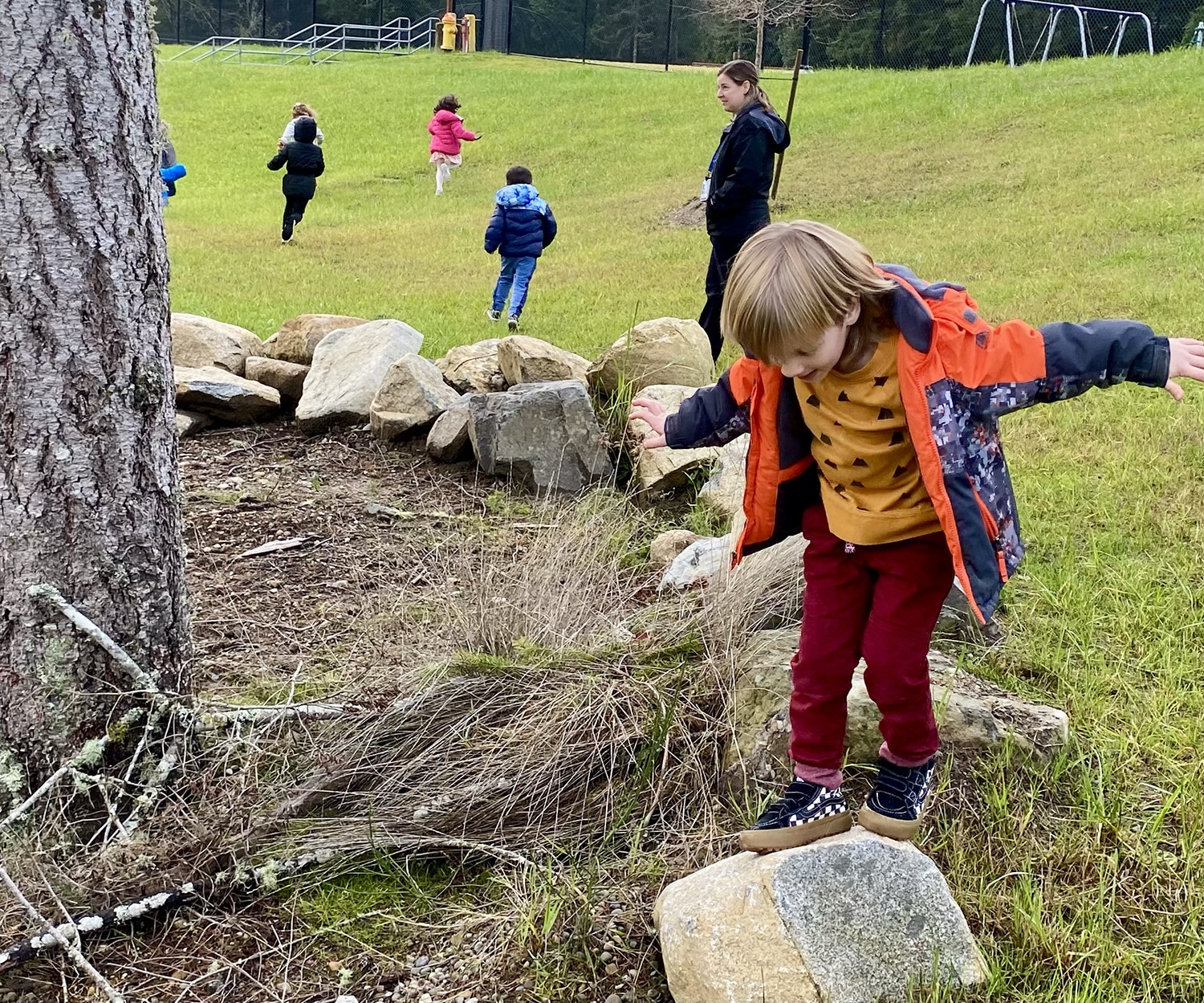
Atticus Golding climbs on rocks in the outdoor education area of Evergreen Elementary School on Dec. 13, 2022. Christina T Henry
Limitless possibilities
Teacher Amanda Kennard deemed her transitional kindergarten students’ first day in the outdoor classroom a success.
“They were just so excited and it was so wonderful to see the learning that happens when they’re outside exploring,” she said.
Supply chain issues, now easing, and other delays have Maxwell and Barber eager to see the Evergreen site more fully developed.
Staff took part in brainstorming exercises to identify their top priorities. For now those include a covered pavilion for holding classes in inclement weather, the natural play area, the garden amenities and weather station.
Beyond that, Maxwell said, the possibilities are endless as the great outdoors.
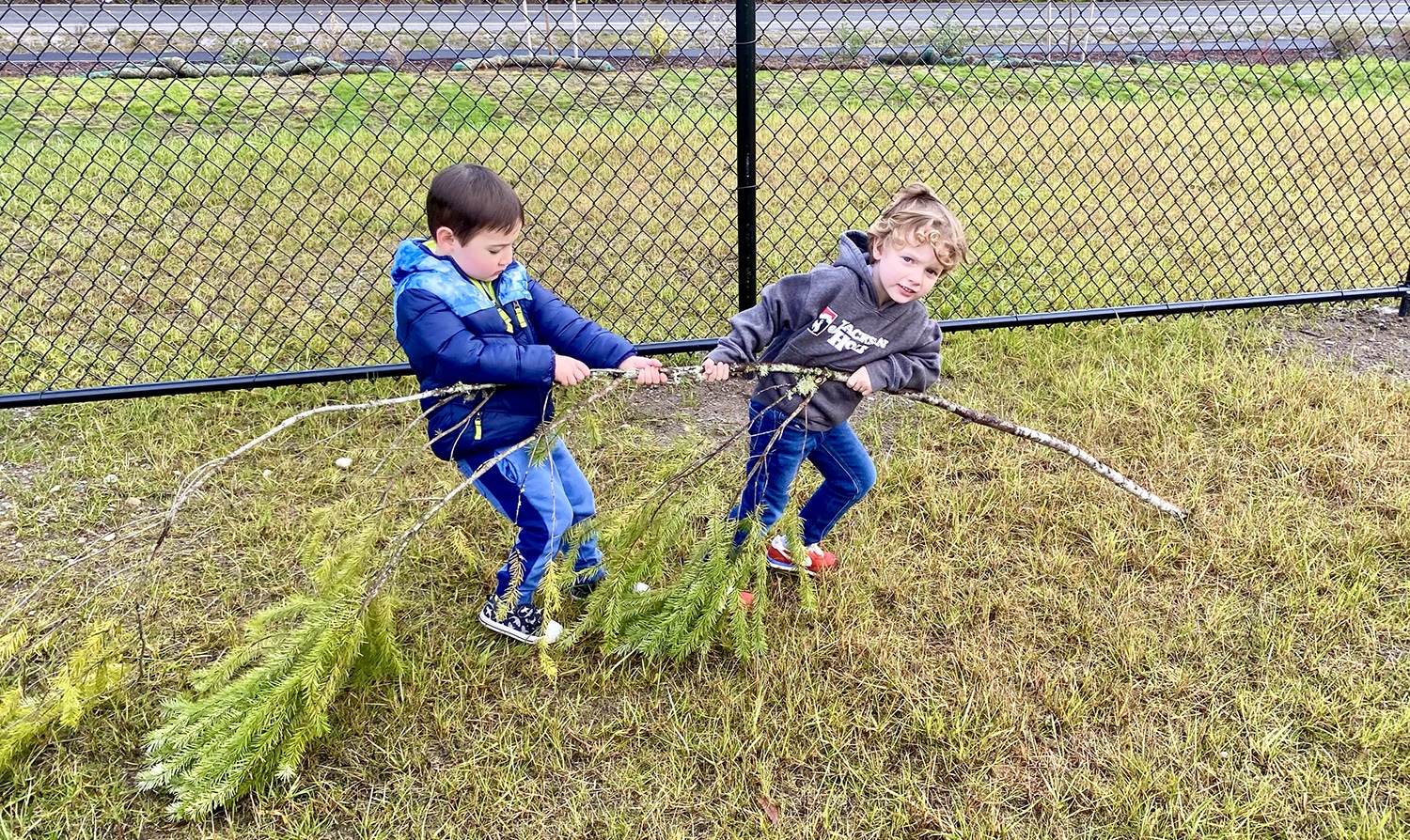
Connor Kovalick and Braxton Harris have a tug-of-war with a fir branch in the outdoor education area of Evergreen Elementary School on Dec. 13, 2022. Christina T Henry

